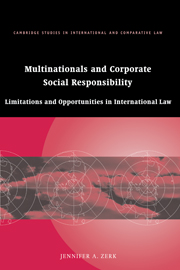 Multinationals and Corporate Social Responsibility
Multinationals and Corporate Social Responsibility Book contents
- Frontmatter
- Contents
- Preface
- Table of treaties, declarations and other international instruments
- Table of cases
- Table of statutes and statutory instruments
- List of abbreviations
- Introduction
- Part I Regulatory issues and problems
- Part II Home state regulation of multinationals
- Part III International regulation of multinationals
- Bibliography
- Index
- CAMBRIDGE STUDIES IN INTERNATIONAL AND COMPARATIVE LAW
Introduction
Published online by Cambridge University Press: 23 July 2009
- Frontmatter
- Contents
- Preface
- Table of treaties, declarations and other international instruments
- Table of cases
- Table of statutes and statutory instruments
- List of abbreviations
- Introduction
- Part I Regulatory issues and problems
- Part II Home state regulation of multinationals
- Part III International regulation of multinationals
- Bibliography
- Index
- CAMBRIDGE STUDIES IN INTERNATIONAL AND COMPARATIVE LAW
Summary
Multinationals are not traditional subjects of international law. Historically, the role of international law in relation to multinationals has primarily been to define the rights and obligations of states with respect to international investment issues. International law has been used to regulate the jurisdiction of states over multinationals, and their rights of diplomatic protection and, through treaties, has provided states with a means by which investment conditions for multinationals could be stabilised, harmonised, and generally enhanced.
But the world is changing fast. Concern about the social and environmental impacts of ‘globalisation’ means that new demands are now being made of international law. Can international law respond to these demands? Does international law provide an adequate framework for the regulation of the social and environmental impacts of multinationals on a global scale? Many people think not. Some have doubted that international law is even ‘conceptually equipped’ to perform such a role. Public opinion, too, is generally sceptical as to the extent to which multinationals can be regulated effectively. Critics point out the ease with which multinationals can avoid national regulation through their mobility and flexibility of structure and organisation. While each state is entitled to regulate those parts of a multinational incorporated or operating within its territory, many states may not have the resources or political will to do so effectively, giving rise to differences in social and environmental standards between states.
- Type
- Chapter
- Information
- Multinationals and Corporate Social ResponsibilityLimitations and Opportunities in International Law, pp. 1 - 4Publisher: Cambridge University PressPrint publication year: 2006
- 1
- Cited by
